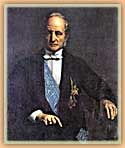 |

A group of intellectuals from Phanar - Alexandros Soutsos (1803-1863), his brother Panagiotis (1806-1868) and Alexandros Rizos Ragavis (1809-1892) - first arrived in Nauplion in the immediate post-revolutionary years, then went on to Athens. They were related to two other important intellectuals: Iakovakis Rizos Neroulos (1778-1850) and Iakovos Rizos Ragavis (1779-1855). The first three belong to, and up to a certain point represent, the generation of scholars which was intellectually shaped during the first centuries following the foundation of the Greek state. In their early literary works, they had not made their linguistic positions quite clear, but still they retained an evident tendency to katharevousa, while as far as politics was concerned, all three joined the so-called constitutional opposition during the time of Kapodistrias as well as during the time of Otto later on. The intellectual works of these three men from Phanar were influenced by the poetry of Byron. The effect of the European tide of romanticism in general was already evident in the Odoiporos (The traveller) by P. Soutsos (1831). In 1837 and 1840, Ragavis published two volumes entitled Various Poems. Alexandros Soutsos participated more actively in the political affairs of the new-fangled kingdom and came out against the Otto regime; for this he was persecuted and imprisoned. He died in Smyrna, after having written the Poiitiko Chartofylakio (Poetical portfolio) (1845), the poem I Tourkomachos Hellas (Hellas fighting the Turks) (1850), where he dealt with themes from the Revolution of 1821, and lastly The poetic memoirs on the Eastern war,in 1857. Panagiotis Soutsos, his brother, followed the Kithara (Guitar) (1835) and the Tria lyrika dramata (Three lyrical dramas) (1842) with the manifesto for the New School of written speech. Resurrection of the ancient Greek language, favoured by all (1853), where the basic positions of the First Athenian School were set out. A little later, the collections of Ragavis Dionysou plous (Dionysos sailing) (1864) and O gorgos ierax (The fast hawk) (1871) constitute some of the most characteristic moments of Athenian romanticism, where the use of the archaizing language and classicism in style was intense. As regards their performance in prose, the scholars from Phanar were the forerunners in this field as well. Of course, they did not escape the general rule of that era, according to which prose was not considered as refined as poetry. In 1834, Panagiotis Soutsos wrote the 'mythistoria' (fiction) Leandros, while a few years later his brother Alexandros published the Exoristos tou 1831 (The exile of 1831). Of the prose written by Ragavis, the Afthentis tou Moreos (Lord of Morea) (1850) and the short stories O Symvolaiografos (The Notary) (1850) and Excursion to Poros (1863) should be noted.
|
 |